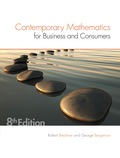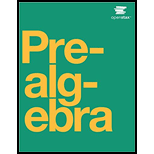
Contemporary Mathematics for Business & Consumers
8th Edition
ISBN: 9781305886803
Author: Brechner
Publisher: Cengage
expand_more
expand_more
format_list_bulleted
Question
Chapter 2.II, Problem 1RE
To determine
To calculate: The least common denominator for the fraction,
Expert Solution & Answer
Trending nowThis is a popular solution!

Students have asked these similar questions
5. Suppose that a mass of 5 stretches a spring 10. The mass is acted on by an external force
of F(t)=10 sin () and moves in a medium that gives a damping coefficient of ½. If the mass
is set in motion with an initial velocity of 3 and is stretched initially to a length of 5. (I
purposefully removed the units- don't worry about them. Assume no conversions are
needed.)
a) Find the equation for the displacement of the spring mass at time t.
b) Write the equation for the displacement of the spring mass in phase-mode form.
c) Characterize the damping of the spring mass system as overdamped, underdamped or
critically damped. Explain how you know.
D.E. for Spring Mass Systems
k
m* g = kLo
y" +—y' + — —±y = —±F(t), y(0) = yo, y'(0) = vo
m
2
A₁ = √c₁² + C₂²
Q = tan-1
4. Given the following information determine the appropriate trial solution to find yp. Do not
solve the differential equation. Do not find the constants.
a) (D-4)2(D+ 2)y = 4e-2x
b) (D+ 1)(D² + 10D +34)y = 2e-5x cos 3x
9.7 Given the equations
0.5x₁-x2=-9.5
1.02x₁ - 2x2 = -18.8
(a) Solve graphically.
(b) Compute the determinant.
(c) On the basis of (a) and (b), what would you expect regarding
the system's condition?
(d) Solve by the elimination of unknowns.
(e) Solve again, but with a modified slightly to 0.52. Interpret
your results.
Chapter 2 Solutions
Contemporary Mathematics for Business & Consumers
Ch. 2.I - For each of the following, identify the type of...Ch. 2.I - Prob. 2TIECh. 2.I - Convert the following mixed numbers to improper...Ch. 2.I - Prob. 4TIECh. 2.I - Prob. 5TIECh. 2.I - Prob. 6TIECh. 2.I - Prob. 1RECh. 2.I - Prob. 2RECh. 2.I - Prob. 3RECh. 2.I - Prob. 4RE
Ch. 2.I - Prob. 5RECh. 2.I - Prob. 6RECh. 2.I - Prob. 7RECh. 2.I - Prob. 8RECh. 2.I - Prob. 9RECh. 2.I - Prob. 10RECh. 2.I - Prob. 11RECh. 2.I - Prob. 12RECh. 2.I - Prob. 13RECh. 2.I - Prob. 14RECh. 2.I - Prob. 15RECh. 2.I - Prob. 16RECh. 2.I - Prob. 17RECh. 2.I - Use inspection or the greatest common divisor to...Ch. 2.I - Use inspection or the greatest common divisor to...Ch. 2.I - Prob. 20RECh. 2.I - Prob. 21RECh. 2.I - Prob. 22RECh. 2.I - Prob. 23RECh. 2.I - Use inspection or the greatest common divisor to...Ch. 2.I - Use inspection or the greatest common divisor to...Ch. 2.I - Prob. 26RECh. 2.I - Prob. 27RECh. 2.I - Prob. 28RECh. 2.I - Prob. 29RECh. 2.I - Raise the following fractions to higher terms as...Ch. 2.I - Prob. 31RECh. 2.I - Raise the following fractions to higher terms as...Ch. 2.I - Prob. 33RECh. 2.I - Prob. 34RECh. 2.I - Prob. 35RECh. 2.I - Prob. 36RECh. 2.I - Prob. 37RECh. 2.I - Raise the following fractions to higher terms as...Ch. 2.I - Raise the following fractions to higher terms as...Ch. 2.I - SECTION I – UNDERSTANDING AND WORKING WITH...Ch. 2.I - Prob. 41RECh. 2.I - Section I • Understanding and working with...Ch. 2.I - Section I Understanding and working with...Ch. 2.I - Section I • Understanding and working with...Ch. 2.II - Determine the least common denominator of the...Ch. 2.II - Prob. 8TIECh. 2.II - Prob. 9TIECh. 2.II - Prob. 10TIECh. 2.II - Prob. 11TIECh. 2.II - Prob. 12TIECh. 2.II - Prob. 13TIECh. 2.II - Prob. 1RECh. 2.II - Prob. 2RECh. 2.II - Prob. 3RECh. 2.II - Prob. 4RECh. 2.II - Prob. 5RECh. 2.II - Prob. 6RECh. 2.II - Prob. 7RECh. 2.II - Prob. 8RECh. 2.II - Prob. 9RECh. 2.II - Prob. 10RECh. 2.II - Prob. 11RECh. 2.II - Prob. 12RECh. 2.II - Prob. 13RECh. 2.II - Prob. 14RECh. 2.II - Prob. 15RECh. 2.II - Prob. 16RECh. 2.II - Prob. 17RECh. 2.II - Crate and Barrel shipped three packages to New...Ch. 2.II - Prob. 19RECh. 2.II - BrewMasters Coffee Co. purchased 1212 tons of...Ch. 2.II - Prob. 21RECh. 2.II - Prob. 22RECh. 2.II - Prob. 23RECh. 2.II - Subtract the following fractions and reduce to...Ch. 2.II - Prob. 25RECh. 2.II - Prob. 26RECh. 2.II - Prob. 27RECh. 2.II - Prob. 28RECh. 2.II - Prob. 29RECh. 2.II - A particular dress requires 314 yards of fabric...Ch. 2.II - 31. Robert Burkart bought a frozen,...Ch. 2.II - 32. Brady White weighed pounds when he decided to...Ch. 2.II - Prob. 33RECh. 2.II - Tim Kenney, a painter, used 645 gallons of paint...Ch. 2.II - You are an executive with the Varsity Corporation...Ch. 2.III - Multiply and reduce to lowest terms.
Ch. 2.III - Multiply and reduce to lowest terms.
a. b.
Ch. 2.III - Divide the following fractions and mixed...Ch. 2.III - Multiply the following fractions and reduce to...Ch. 2.III - Multiply the following fractions and reduce to...Ch. 2.III - Multiply the following fractions and reduce to...Ch. 2.III - Multiply the following fractions and reduce to...Ch. 2.III - Multiply the following fractions and reduce to...Ch. 2.III - Multiply the following fractions and reduce to...Ch. 2.III - Multiply the following fractions and reduce to...Ch. 2.III - Multiply the following fractions and reduce to...Ch. 2.III - Multiply the following fractions and reduce to...Ch. 2.III - Multiply the following fractions and reduce to...Ch. 2.III - Multiply the following fractions and reduce to...Ch. 2.III - Multiply the following fractions and reduce to...Ch. 2.III - 13. A recent market research survey showed that ...Ch. 2.III - 14. Wendy Wilson planned to bake a triple recipe...Ch. 2.III - A driveway requires 912 truckloads of gravel. If...Ch. 2.III - Melissa Silva borrowed $4,200 from the bank. If...Ch. 2.III - Amy Richards movie collection occupies 58 of her...Ch. 2.III - Three partners share a business. Max owns 38,...Ch. 2.III - Divide the following fractions and reduce to...Ch. 2.III - Divide the following fractions and reduce to...Ch. 2.III - Divide the following fractions and reduce to...Ch. 2.III - Divide the following fractions and reduce to...Ch. 2.III - Divide the following fractions and reduce to...Ch. 2.III - Divide the following fractions and reduce to...Ch. 2.III - Divide the following fractions and reduce to...Ch. 2.III - Divide the following fractions and reduce to...Ch. 2.III - Divide the following fractions and reduce to...Ch. 2.III - Divide the following fractions and reduce to...Ch. 2.III - Divide the following fractions and reduce to...Ch. 2.III - Divide the following fractions and reduce to...Ch. 2.III - Frontier Homes, Inc., a builder of custom homes,...Ch. 2.III - An automobile travels 365 miles on 1623 gallons of...Ch. 2.III - 33. Pier 1 Imports purchased 600 straw baskets...Ch. 2.III - 34. At the Cattleman’s Market, pounds of...Ch. 2.III - 35. Super Value Hardware Supply buys nails in bulk...Ch. 2.III - The chef at the Sizzling Steakhouse has 140 pounds...Ch. 2.III - Regal Reflective Signs makes speed limit signs for...Ch. 2.III - 38. Engineers at Triangle Electronics use special...Ch. 2.III - 39. At Celtex Manufacturing, a chemical etching...Ch. 2.III - 40. You are the owner of The Gourmet Diner. On...Ch. 2 - 1. In fractions, the number above the division...Ch. 2 - 2. The numerator of a proper fraction is...Ch. 2 - To convert an improper fraction to a whole or...Ch. 2 - 4. To convert a mixed number to an improper...Ch. 2 - Prob. 5CRCh. 2 - Prob. 6CRCh. 2 - Prob. 7CRCh. 2 - Prob. 8CRCh. 2 - Prob. 9CRCh. 2 - Prob. 10CRCh. 2 - Prob. 11CRCh. 2 - Prob. 12CRCh. 2 - Prob. 13CRCh. 2 - Prob. 14CRCh. 2 - Identify the type of fraction and write it in word...Ch. 2 - Prob. 2ATCh. 2 - Prob. 3ATCh. 2 - Prob. 4ATCh. 2 - Prob. 5ATCh. 2 - Prob. 6ATCh. 2 - Prob. 7ATCh. 2 - Prob. 8ATCh. 2 - Prob. 9ATCh. 2 - Convert to higher terms as indicated.
10. to...Ch. 2 - Prob. 11ATCh. 2 - Prob. 12ATCh. 2 - Prob. 13ATCh. 2 - Prob. 14ATCh. 2 - Prob. 15ATCh. 2 - Prob. 16ATCh. 2 - Prob. 17ATCh. 2 - Prob. 18ATCh. 2 - Prob. 19ATCh. 2 - Prob. 20ATCh. 2 - 21. The Bean Counters, an accounting firm, has 161...Ch. 2 - Ventura Coal mined 623 tons on Monday, 734 tons on...Ch. 2 - 23. A blueprint of a house has a scale of 1 inch...Ch. 2 - If 38 of a 60-pound bag of ready-mix concrete is...Ch. 2 - Prob. 25ATCh. 2 - 26. During a spring clearance sale, Sears...Ch. 2 - You are a sales representative for Boaters...Ch. 2 - 28. A developer owns three lots measuring acres...Ch. 2 - 29. A house has 4,400 square feet. The bedrooms...Ch. 2 - 30. Among other ingredients, a recipe for linguini...Ch. 2 - You are an engineer with Ace Foundations, Inc....
Knowledge Booster
Learn more about
Need a deep-dive on the concept behind this application? Look no further. Learn more about this topic, subject and related others by exploring similar questions and additional content below.Similar questions
- 3. Determine the appropriate annihilator for the given F(x). a) F(x) = 5 cos 2x b) F(x)=9x2e3xarrow_forward12.42 The steady-state distribution of temperature on a heated plate can be modeled by the Laplace equation, 0= FT T + 200°C 25°C 25°C T22 0°C T₁ T21 200°C FIGURE P12.42 75°C 75°C 00°C If the plate is represented by a series of nodes (Fig. P12.42), cen- tered finite-divided differences can be substituted for the second derivatives, which results in a system of linear algebraic equations. Use the Gauss-Seidel method to solve for the temperatures of the nodes in Fig. P12.42.arrow_forward9.22 Develop, debug, and test a program in either a high-level language or a macro language of your choice to solve a system of equations with Gauss-Jordan elimination without partial pivoting. Base the program on the pseudocode from Fig. 9.10. Test the program using the same system as in Prob. 9.18. Compute the total number of flops in your algorithm to verify Eq. 9.37. FIGURE 9.10 Pseudocode to implement the Gauss-Jordan algorithm with- out partial pivoting. SUB GaussJordan(aug, m, n, x) DOFOR k = 1, m d = aug(k, k) DOFOR j = 1, n aug(k, j) = aug(k, j)/d END DO DOFOR 1 = 1, m IF 1 % K THEN d = aug(i, k) DOFOR j = k, n aug(1, j) END DO aug(1, j) - d*aug(k, j) END IF END DO END DO DOFOR k = 1, m x(k) = aug(k, n) END DO END GaussJordanarrow_forward
- 11.9 Recall from Prob. 10.8, that the following system of equations is designed to determine concentrations (the e's in g/m³) in a series of coupled reactors as a function of amount of mass input to each reactor (the right-hand sides are in g/day): 15c3cc33300 -3c18c26c3 = 1200 -4c₁₂+12c3 = 2400 Solve this problem with the Gauss-Seidel method to & = 5%.arrow_forward9.8 Given the equations 10x+2x2-x3 = 27 -3x-6x2+2x3 = -61.5 x1 + x2 + 5x3 = -21.5 (a) Solve by naive Gauss elimination. Show all steps of the compu- tation. (b) Substitute your results into the original equations to check your answers.arrow_forwardTangent planes Find an equation of the plane tangent to the following surfaces at the given points (two planes and two equations).arrow_forward
- Vectors u and v are shown on the graph.Part A: Write u and v in component form. Show your work. Part B: Find u + v. Show your work.Part C: Find 5u − 2v. Show your work.arrow_forwardVectors u = 6(cos 60°i + sin60°j), v = 4(cos 315°i + sin315°j), and w = −12(cos 330°i + sin330°j) are given. Use exact values when evaluating sine and cosine.Part A: Convert the vectors to component form and find −7(u • v). Show every step of your work.Part B: Convert the vectors to component form and use the dot product to determine if u and w are parallel, orthogonal, or neither. Justify your answer.arrow_forwardSuppose that one factory inputs its goods from two different plants, A and B, with different costs, 3 and 7 each respective. And suppose the price function in the market is decided as p(x, y) = 100 - x - y where x and y are the demand functions and 0 < x, y. Then as x = y= the factory can attain the maximum profit,arrow_forward
- Bob and Teresa each collect their own samples to test the same hypothesis. Bob’s p-value turns out to be 0.05, and Teresa’s turns out to be 0.01. Why don’t Bob and Teresa get the same p-values? Who has stronger evidence against the null hypothesis: Bob or Teresa?arrow_forwardf(x) = = x - 3 x²-9 f(x) = {x + 1 x > 3 4 x < 3 -10 5 10 5 5. 10 5- 07. 10 -10 -5 0 10 5 -101 :: The function has a “step" or "jump" discontinuity at x = 3 where f(3) = 7. :: The function has a value of f (3), a limit as x approaches 3, but is not continuous at x = 3. :: The function has a limit as x approaches 3, but the function is not defined and is not continuous at x = 3. :: The function has a removable discontinuity at x=3 and an infinite discontinuity at x= -3.arrow_forwardReview a classmate's Main Post. 1. State if you agree or disagree with the choices made for additional analysis that can be done beyond the frequency table. 2. Choose a measure of central tendency (mean, median, mode) that you would like to compute with the data beyond the frequency table. Complete either a or b below. a. Explain how that analysis can help you understand the data better. b. If you are currently unable to do that analysis, what do you think you could do to make it possible? If you do not think you can do anything, explain why it is not possible.arrow_forward
arrow_back_ios
SEE MORE QUESTIONS
arrow_forward_ios
Recommended textbooks for you
 Mathematics For Machine TechnologyAdvanced MathISBN:9781337798310Author:Peterson, John.Publisher:Cengage Learning,
Mathematics For Machine TechnologyAdvanced MathISBN:9781337798310Author:Peterson, John.Publisher:Cengage Learning,
 Holt Mcdougal Larson Pre-algebra: Student Edition...AlgebraISBN:9780547587776Author:HOLT MCDOUGALPublisher:HOLT MCDOUGAL
Holt Mcdougal Larson Pre-algebra: Student Edition...AlgebraISBN:9780547587776Author:HOLT MCDOUGALPublisher:HOLT MCDOUGAL Algebra: Structure And Method, Book 1AlgebraISBN:9780395977224Author:Richard G. Brown, Mary P. Dolciani, Robert H. Sorgenfrey, William L. ColePublisher:McDougal Littell
Algebra: Structure And Method, Book 1AlgebraISBN:9780395977224Author:Richard G. Brown, Mary P. Dolciani, Robert H. Sorgenfrey, William L. ColePublisher:McDougal Littell Intermediate AlgebraAlgebraISBN:9781285195728Author:Jerome E. Kaufmann, Karen L. SchwittersPublisher:Cengage Learning
Intermediate AlgebraAlgebraISBN:9781285195728Author:Jerome E. Kaufmann, Karen L. SchwittersPublisher:Cengage Learning

Mathematics For Machine Technology
Advanced Math
ISBN:9781337798310
Author:Peterson, John.
Publisher:Cengage Learning,


Holt Mcdougal Larson Pre-algebra: Student Edition...
Algebra
ISBN:9780547587776
Author:HOLT MCDOUGAL
Publisher:HOLT MCDOUGAL

Algebra: Structure And Method, Book 1
Algebra
ISBN:9780395977224
Author:Richard G. Brown, Mary P. Dolciani, Robert H. Sorgenfrey, William L. Cole
Publisher:McDougal Littell

Intermediate Algebra
Algebra
ISBN:9781285195728
Author:Jerome E. Kaufmann, Karen L. Schwitters
Publisher:Cengage Learning
Understanding Fractions, Improper Fractions, and Mixed Numbers; Author: Professor Dave Explains;https://www.youtube.com/watch?v=qyW2mWvvtZ8;License: Standard YouTube License, CC-BY